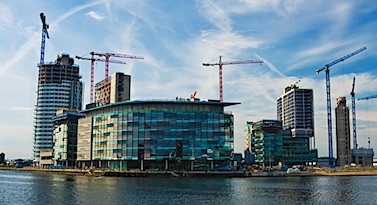Progressive policy think tank IPPR North argues in a new report that the Northern Powerhouse has undoubtedly boosted the economy of the North in many ways — but that its work been held back by the Westminster government’s austerity policies.
Five years on from the launch of the Northern Powerhouse, IPPR North has published new independent analysis of the impact it has had on the region.
Researchers at the leading think-tank have called for central UK government to devolve power and resources to the North of England “so that the region, and the nation, can prosper.”
They argue that the Northern Powerhouse remains an important agenda, and they point to successes including five new metro Mayors and the creation of Transport for the North which has brought forward a £70 billion investment plan.
They said economic growth and employment growth have been higher in the North in than in the rest of the UK over the last five years.
But they also claim that the UK government’s policy programme of austerity has undermined the economy of the North.
The researchers claim:
- The Northern Powerhouse has proceeded against a backdrop of austerity — since 2009-10 the North has seen a £3.6 billion cut in public spending, while the South East and the South West saw a £4.7 billion rise, in real terms. London also saw a cut however, but by less at £256 million.
- Since 2014, public sector employment in the North fell by 2.8%, compared to 1.2% in London, 1.6% in the South West, and 1.7% in the South East.
- In the same time, transport spending rose by more than twice as much per person in London (£330 per person) as in the North (£149 per person), in real terms.
- Total foreign direct investment jobs fell by 23.7% between 2015-16 and 2017-18 in the North, while falling by 21.5% nationally over the period. Research has shown the North is twice as vulnerable to Brexit as London.
- 200,000 more northern children are living in a poor household, meaning there is a total of 800,000 children living in poverty in the North.
- Weekly pay increased by only £12 in the North compared to £19 nationally (in real terms).
- The number of jobs paid less than the living wage rose by 150,000 – increasing by 10.9 per cent.
- The number of cancelled and significantly late trains on TransPennine Express and Northern franchises has more than doubled from 20,000 (2.1%) in 2014/15 to 47,000 (4.9%) in 2018/19.
IPPR North said that despite all this, the Northern economy has shown signs of improvement and these are the foundations upon which a new phase of the Northern Powerhouse, led by and for the North, could be delivered.
IPPR North says that since 2014:
- Economic growth was marginally higher in the North than the national average — growing by 10.7% between 2014 and 2017; this compares to 10.6% for the UK as a whole; and 9.7% for the UK excluding London.
- The North’s productivity gap with the rest of the country has narrowed slightly: productivity in the North grew more than London or any other English region between 2014 and 2017, growing by 8.5%, and compared to 6.6% nationally. The North has gone from 88% as productive as the UK to 89% as productive as the UK.
- Employment in the North grew 6.9% – more than UK employment growth which was 6.2%.
- Manufacturing employment has increased by 55,000 jobs, and professional scientific and technical jobs have increased by 35,000.
Luke Raikes, Senior Research Fellow at IPPR North said: “All of England’s regions have serious economic problems – including our capital.
“Power and resources are hoarded in Westminster and people in all corners of the country miss out.
“That’s why the Northern Powerhouse agenda is important. If we work to power up the North, we can build a fairer, stronger economy for the whole of the UK.
”The North of England must now be a political priority, and the government must go further with devolution and investment to the region.”
Marcus Johns, researcher at IPPR North said: “With 200,000 extra children living in poverty and 150,000 extra people earning less than the real living wage, life has gotten worse for too many Northerners.
“The progress that we’ve seen on devolution over the last five years is certainly welcome, but we now need to see a new phase of the Northern Powerhouse.
“One which is of the North, by the North, for the North.”
Sarah Longlands, Director of IPPR North said: “The Northern Powerhouse agenda has helped to build momentum around the need to address the UK’s unacceptable regional inequalities.
“But it’s clear from our independent analysis that it has failed to tackle fundamental challenges like child poverty, insecure work and poor health.
“If the agenda is to survive, and if we are to build a region, and a nation of prosperity, then the next phase of the Northern Powerhouse must go beyond the rhetoric.
“A better North is possible but it requires a proper long-term, resourced plan for change which works in the interests of people right across the North.”
